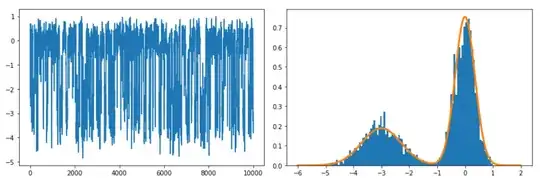I am trying to implement a Metropolis routine to evaluate simple integrals. While it seem that the Markov chains I obtain reproduce the correct function, the area is simply wrong. Suppose I want to integrate the following (picture just below):
$$\int_{-5}^{1}2e^{4(-x^2)} + 0.5e^{-(x+3)^2}\text{d}x \approx 2.65$$
However, when I run my code I get a value of $\approx6.4$. I am not sure if this is due to my script or my choice of the prior interval (I assume it's $6$ from the uniform distribution within the bounds of integration).
This may be related to this issue, because I receive a similar incorrect value as in that post if I also run it for a sine function from $0$ to $\pi$, although I think I keep track of the rejected samples. I'm just learning the method so would appreciate simple answers.
def integrand(x):
if -5. <= x <= 1.:
return 2*np.exp(4*(-x**2)) + 0.5*np.exp(-(x+3)**2)
else:
return 0
n = 10000 #number of iterations
#performs algorithm and returns array of the samples
def metropolis(f, iter=n):
x = 0. #initial x
chain = np.zeros((iter, 1))
for i in range(iter):
x_new = np.array(x) + np.random.normal(size=1)
if np.random.rand() < np.minimum(1, f(x_new) / f(x)):
x = x_new
chain[i] = x
return chain
#run algorithm for the function
samples = metropolis(integrand, iter=n)
#evaluate area
area = 0
for i in range(len(samples)):
area += function(samples[i])
area = 6*(1/len(samples))*area
print(area)
